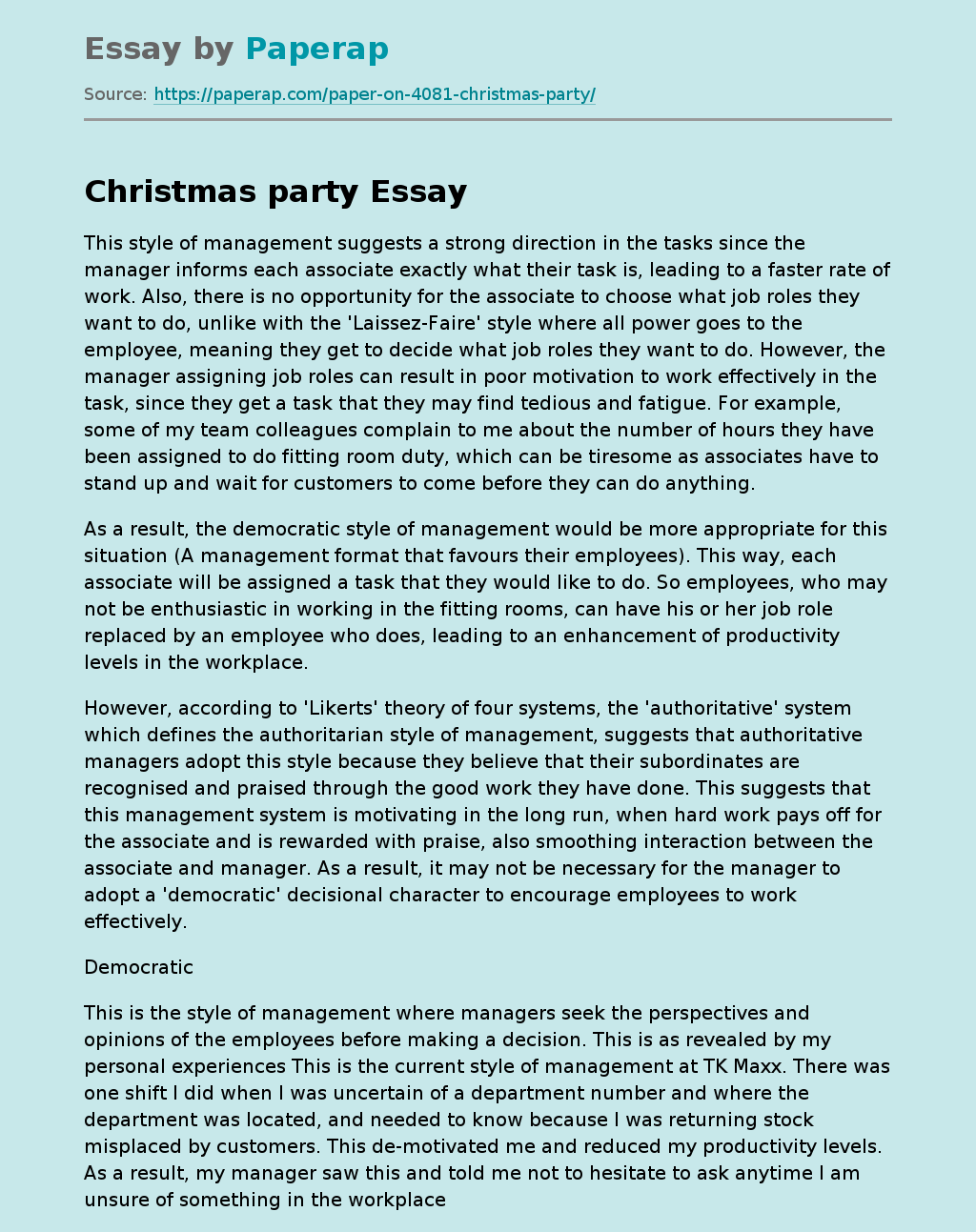Christmas party
The following sample essay on this style of management suggests a strong direction in the tasks since the manager informs each associate exactly what their task is, leading to a faster rate of work. Also, there is no opportunity for the associate to choose what job roles they want to do, unlike with the ‘Laissez-Faire’ style where all power goes to the employee, meaning they get to decide what job roles they want to do. However, the manager assigning job roles can result in poor motivation to work effectively in the task, since they get a task that they may find tedious and fatigue.
For example, some of my team colleagues complain to me about the number of hours they have been assigned to do fitting room duty, which can be tiresome as associates have to stand up and wait for customers to come before they can do anything. As a result, the democratic style of management would be more appropriate for this situation (A management format that favours their employees).
This way, each associate will be assigned a task that they would like to do. So employees, who may not be enthusiastic in working in the fitting rooms, can have his or her job role replaced by an employee who does, leading to an enhancement of productivity levels in the workplace. However, according to ‘Likerts’ theory of four systems, the ‘authoritative’ system which defines the authoritarian style of management, suggests that authoritative managers adopt this style because they believe that their subordinates are recognised and praised through the good work they have done.
This suggests that this management system is motivating in the long run, when hard work pays off for the associate and is rewarded with praise, also smoothing interaction between the associate and manager. As a result, it may not be necessary for the manager to adopt a ‘democratic’ decisional character to encourage employees to work effectively.
Democratic
This is the style of management where managers seek the perspectives and opinions of the employees before making a decision. This is as revealed by my personal experiences This is the current style of management at TK Maxx. There was one shift I did when I was uncertain of a department number and where the department was located, and needed to know because I was returning stock misplaced by customers. This de-motivated me and reduced my productivity levels. As a result, my manager saw this and told me not to hesitate to ask anytime I am unsure of something in the workplace. After, I was able to work quickly and effectively.
It can be deduced that a democratic format of managing can help to motivate employees. This is since they are happy to help employees and inform them again and again of what exactly their task is anytime they hesitate. With the manager being able to talk with the employee and solve their problem based on the task, this suggests a two-way communication between managers and employees, unlike the authoritarian rule, where there is only communication once the objectives have been set for the employees. Eventually this will lead to the development of manger-employee relationships, meaning that employees will be more willing to carry out tasks on the command of the democratic manager (hence motivation). At one meeting (in the winter season) where almost all the associates working in the store were present, the manager announced that TK Maxx is rewarding their associates with a Christmas party. Everyone was then asked to vote where they wanted the venue of the party to be held. As a result, the democratic system of management may enhance morale through opportunities for associates to contribute unique ideas for the Christmas party and get approval. However, with too many people being involved in the Christmas party decision making process, it can be time consuming which can de-motivate employees due to tediousness. Also, it could further lead to disputes among team members with opposing views.
The current manager at TK Maxx has a very friendly personality. He has a very good sense of humour, which keeps me and my team colleagues amused, and helps to maintain a positive atmosphere in the workplace. He also shows concern for his employees. For example, when I am not doing something properly in the workplace, he acknowledges and shows me the right way. As a result, according to the ‘continuum-based theory’, the manager’s personality type matches their management style, and it can be deduced that the current manager is of a democratic style. This suggests that the manager is sticking to a type of management that he can specialise in (i.e. democratic due to his personality), to motivate his employees. Therefore, there may be a need to stick to personality relevant management format, rather than adopting different management styles required by different situations (hence ‘contingency management theory’).
Christmas party. (2017, Aug 29). Retrieved from https://paperap.com/paper-on-4081-christmas-party/

